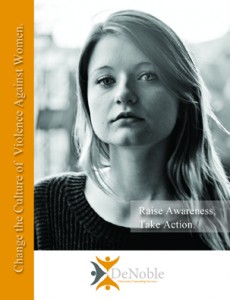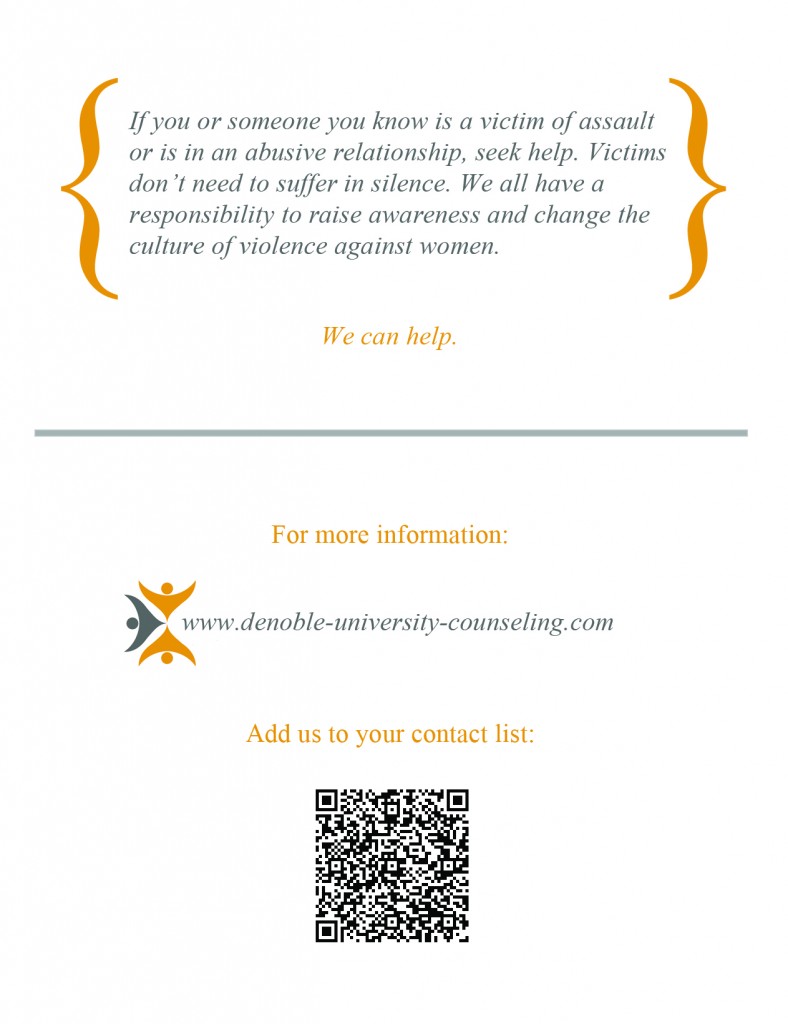Gender Considerations in Safety and Prevention
Fall 2014
By Mark DeNoble
In light of the recent tragedy that befell Charlottesville, many students have asked me for advice regarding personal safety. If you are a student reading this, please heed my advice. If you are an alumna, please share this with your daughters.
If you are ever lost, find the nearest female. Females are far less likely to harm you than males. In the event this female cannot fully assist, you can at least enlist her help in finding the nearest police officer or safe space. Especially if you are scared or intoxicated, your judgment might not be as sharp as it could be, and having a partner will give you an extra helping hand.
The reverse is also true. As a female, be sure to help those in need. Some women may be too scared or too proud to ask for assistance, and I urge you to be assertive: Do not hesitate to offer a helping a hand if you see someone walking alone or struggling in any way. It never hurts to ask if someone needs assistance. Those of you that have worked retail know the phrase “May I help you?” At worst this is an annoyance, but at best, it can really make a difference in someone’s life.
 This advice is not a knock against the guys. There are lots of wonderful men out there. You might know many, are related to many, and have been raised by many. However, when it comes to your safety, you must abide by the odds. Remember, one in four college women have encountered a sexual assault situation perpetrated by men. To put this in perspective, you have a 1 in 175 million chance of winning the lottery. One in four is pretty significant. The next time you are sitting in class with 19 other students, imagine that 5 of those has experienced sexual assault. Chances are you know someone who has been assaulted. If you do not, and are not thinking this is a significant problem, here is something to consider: many statistics suggest that 95% of college sexual assaults go unreported.
This advice is not a knock against the guys. There are lots of wonderful men out there. You might know many, are related to many, and have been raised by many. However, when it comes to your safety, you must abide by the odds. Remember, one in four college women have encountered a sexual assault situation perpetrated by men. To put this in perspective, you have a 1 in 175 million chance of winning the lottery. One in four is pretty significant. The next time you are sitting in class with 19 other students, imagine that 5 of those has experienced sexual assault. Chances are you know someone who has been assaulted. If you do not, and are not thinking this is a significant problem, here is something to consider: many statistics suggest that 95% of college sexual assaults go unreported.
Recent headlines remind us to be safe, but they can also be misleading. The off-Grounds monster preying on college students can and does exist, but most sexual assaults still occur by acquaintances rather than strangers. At a place like UVa that prides itself on being a community of trust, we expect that no one in the community will harm us, but they sometimes do. This makes it all the more confusing for women who have grown up around a lot of wonderful, upstanding men. This is why Caitlin Schram (Class of 2017) and I developed the “Mind of Men” Workshop. The workshop is sponsored by the Yeardley Love Endowment Program Grant and will be offered exclusively to Theta in November. The goal of the workshop is to increase awareness of potentially unhealthy dating behaviors by holding an interactive conversation about males and their intentions and perspectives. Although assault and rape is never the survivor’s fault, increased awareness can help prevent an assault. If females are more knowledgeable of men’s intentions, then they are empowered and can choose to accept or deny advances from a more educated and thoughtful perspective, or remove themselves from the situation entirely.
The workshop will feature a video made by Thetas, which was directed and edited by Caitlin, followed by a discussion of gender considerations in safety and prevention. As a preview, here are some key messages that I will share with students at the workshop, which I believe are also pertinent to share now:
If a man approaches you, evaluate him. You are not comparing him to all men; rather, you are trying to determine this man’s motivations.
Consider this: when a man approaches you, he wants something from you. It may be that he wants to have an interesting conversation. Although if he does not know you, then his approach is purely based on looks or opportunity (i.e.: you are alone). This does not mean he is a rapist, but at the least you have to consider that he is looking for something. Again, remember the one in four statistic.
Consider this: If you accept something from a guy, expect that you will feel obligated to him. If a guy offers you a drink or a ride home, he may be nice and chivalrous, but you will now feel obligated to talk to him, or to give him something, such as your number. This does not mean he is trying to harm you, but be aware that you have now given him some power over you.
Consider this: If a guy teases you with a slight insult, he knows you will be provoked to prove him wrong. For example, when he says, “I bet you suck at beer pong,” he is trying to get you to play. Perhaps he wants to play for fun, or perhaps he wants you to drink more.
Men will go to great lengths to avoid hurting their pride. This causes some men to avoid approaching women altogether, while others become angry and resort to games and manipulation. Most of you do not want to be unapproachable and would like to enter into deep and loving relationships. So my advice for you is simple: Do not be afraid to be assertive around men. Sometimes you might worry that saying “no” might make them mad at you, or turning down their offers will insult them, but good guys will understand your concerns and respect your choices. In many respects, your assertion weeds out the guys that are not worth your time. Remember that awareness empowers you to take action by making educated decisions based on knowledge of behaviors and statistics; while assertiveness helps uphold the community of trust and deepens your relationship with others.
I hope that you will encourage a Theta to attend the workshop. The November date and time is being finalized and will be announced soon.
For further reading on self-protection, I recommend “The Gift of Fear: and Other Survival Signals that Protect us from Violence” by Gavin DeBecker. Mr. DeBecker is a world renowned threat assessment consultant who has worked with universities, corporations, celebrities, and the general public.
Thank You
Yeardley Love Endowment Program Grant
Collegiate life can be extremely complicated, and it can be further complicated by dating and relationships. For example, poor relationships can lead to distraction, additional stress, poor academic performance, depression, or potentially worse. In Spring 2014, I proposed a specialized training program designed specifically for Kappa Alpha Theta to engage UVa Thetas and their partners in a constructive dialogue to learn and explore healthy relationship behaviors. Additional education and support for female students and their partners can help alleviate stress while enhancing their academic performance. Due to the generosity of the Yeardley Love Endowment Program Grant, I was able to develop and facilitate the program this Fall.
As discussed in the previous article, I was able to find a volunteer, Caitlin Schram (Theta, 2017) who helped me create the “Mind of Men” workshop. Caitlin was integral in making the workshop student-specific, interactive, and engaging. The workshop will be held in November, date and time pending.
In addition to this workshop I was able to offer an intensive five-week counseling program for two Thetas. The sessions provided these students a safe space to work on alleviating relationship issues that may otherwise have prevented them from achieving their personal and professional goals. In addition, it is my hope that the experience will have meaningful and lasting effects on their development as young women with self-worth and interpersonal fulfillment, who can serve as leaders and role models on Grounds.
In sessions, the students:
- Learned healthy boundaries and traits necessary for successful relationships.
- Explored past experiences that contributed to low self-esteem, and used the therapeutic relationship to develop self-esteem.
- Resolved fear of rejection and worked toward autonomy and interdependence.
- Discussed relationship role models such as parents, relatives, and friends.
- Explored how social media portrays relationships and can contribute to dysfunctional beliefs regarding relationships.
- Developed a consistent, positive self-image.
- Established an inward sense of self-worth, confidence, and competence.
As a result, these students wrote letters to the Yeardley Love Endowment Program Grant, thanking them for their support.
Here are two brief excerpts of what they had to say:
Thanks to the Yeardley Love Endowment Grant, I learned so much about healthy relationships and am healing from my last bad experience.
Mark helped me to stop my ex-boyfriend from continuously calling me and trying to control me. I am now doing much better and want to thank the Yeardley Love Endowment Grant for giving me this opportunity.
Although the grant funded sessions have been used, you can still schedule a consultation with me if you so desire. My website and contact information is below. You can also always ask Caitlin about me and the services I offer, and have her put you in touch with me.
Ph.D., Higher Education Administration, University of Virginia
Ed.S., Counseling Psychology, James Madison University
National Certified Counselor (NCC)
Media Relations Intern
Undergrad, Media Studies
University of Virginia, Kappa Alpha Theta, Class of 2017



